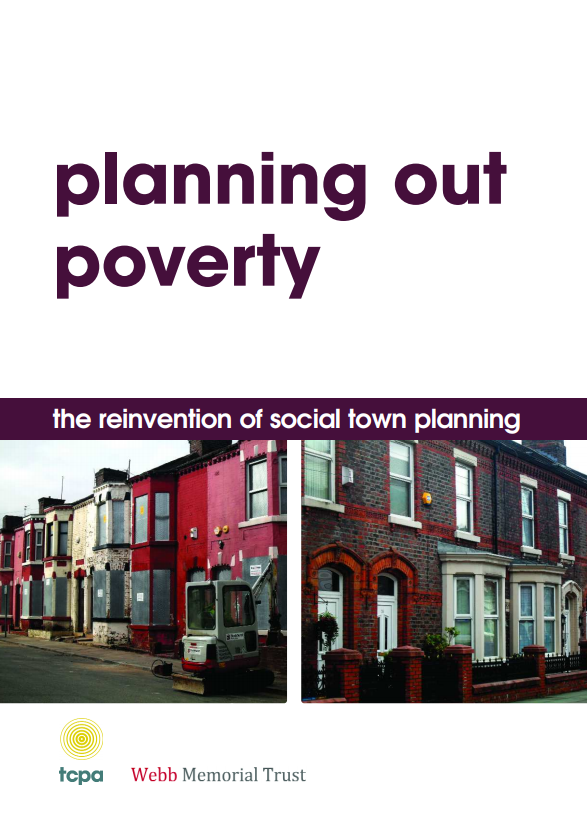Planning out Poverty
Posted on 01 Sep 2013 Categories: Uncategorized
Throughout 2013 the Town and Country Planning Association worked with the Webb Memorial Trust on a case study based research project to explore the overarching question ‘how can we re-focus planning to be more effective in dealing with social exclusion?‘ The project is not a study into poverty in general, but about how we challenge social exclusion through planning in different urban contexts.
The context
Since the end of the 19th century planning has made a significant contribution to improving the quality of life of ordinary people through the provision of well planned social housing and infrastructure. However, over the last 30 years there has been a growing disconnect between planning and a progressive social agenda. Our society has become more unequal whilst spatial concentrations of poverty have continued to deepen. We have failed to learn from successes and failures in the past, and there is growing evidence that many of the current Government’s responses are exacerbating inequality.
About the project
The project explores four case study locations across England, each with diverse socio-economic backgrounds and distinct patterns of social exclusion, all of which are seeking a pathway to regeneration. These are Anfield in Liverpool, an inner-city community within a large ex-industrial metropolitan city; Shirebrook in the Derbyshire Coalfields, an isolated ex-industrial rural town; Middleton and Belle Isle in Leeds, part of a major inter-war social housing development based on garden city principles; and Tottenham Hale, a diverse inner-city community in Haringey, North London.
The report contains four important messages:
- The planning system, even in its current residualised form, can make a major impact on social exclusion in a number of ways, from access to employment, services and a healthy environment, to designing mixed communities and promoting community governance.
- While there are successes, the planning system too often fails to consider the distributional outcomes of decisions for people most in need.
- The reason for this failure is partly because planning is no longer recognised as a mainstream part of public policy in poverty reduction, and because national planning policy has de-prioritised social justice as an outcome.
- There are practical measures which the public and private sectors can implement to make the system work better for those in poverty, by maximising the opportunities for renewal and development to meet their needs.
The report suggests that we need a profound reconsideration of the social purposes of planning and calls for the reinvention of ‘social town planning’. It offers 12 policy recommendations to national and local government as well as to the private sector and the wider planning community which reflect the project’s ambition to embed the importance of social issues within planning practice. The recommendations are:
Recommendations for national government
- Recommendation 1: Make changes to the National Planning Policy Framework to prioritise poverty reduction.
- Recommendation 2: Introduce new legal duties on poverty reduction.
- Recommendation 3: Change the National Planning Practice Guidance to include guidance on poverty reduction and the promotion of social justice.
- Recommendation 4: Enhance planning powers for local communities.
- Recommendation 5: Target neighbourhood planning support in areas of social exclusion.
- Recommendation 6: Review the impact of welfare, housing and planning reform on poverty reduction.
- Recommendation 7: Introduce a new form of placed-based area planning.
Recommendations for local government
- Recommendation 8: Integrate planning with local placed-based service delivery, including through ‘single integrated departments’.
- Recommendation 9: Share and promote local government led best practice.
Recommendations for the private sector
- Recommendation 10: Encourage greater corporate social responsibility.
Recommendations for the planning community
- Recommendation 11: Develop a ‘new vision’ for the planning profession.
- Recommendation 12: Enhance skills and education.
Download the Planning out Poverty report
Posted on 01 Sep 2013 Categories: Uncategorized

